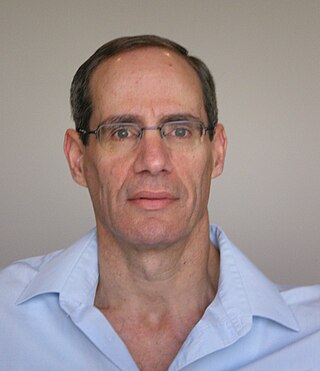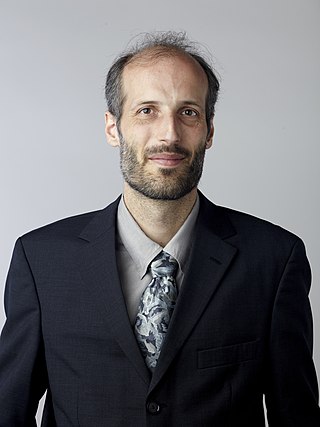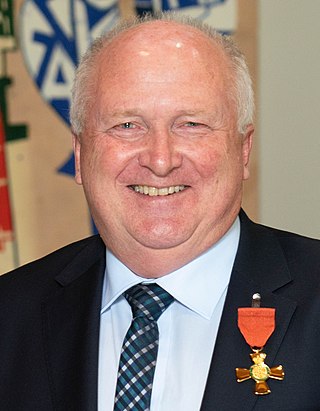Related Research Articles

Béla Bollobás FRS is a Hungarian-born British mathematician who has worked in various areas of mathematics, including functional analysis, combinatorics, graph theory, and percolation. He was strongly influenced by Paul Erdős since the age of 14.

Doron Zeilberger is an Israeli mathematician, known for his work in combinatorics.

Peter Clive Sarnak is a South African-born mathematician with dual South-African and American nationalities. Sarnak has been a member of the permanent faculty of the School of Mathematics at the Institute for Advanced Study since 2007. He is also Eugene Higgins Professor of Mathematics at Princeton University since 2002, succeeding Sir Andrew Wiles, and is an editor of the Annals of Mathematics. He is known for his work in analytic number theory. He also sits on the Board of Adjudicators and the selection committee for the Mathematics award, given under the auspices of the Shaw Prize.

Noga Alon is an Israeli mathematician and a professor of mathematics at Princeton University noted for his contributions to combinatorics and theoretical computer science, having authored hundreds of papers.

Thomas Penyngton Kirkman FRS was a British mathematician and ordained minister of the Church of England. Despite being primarily a churchman, he maintained an active interest in research-level mathematics, and was listed by Alexander Macfarlane as one of ten leading 19th-century British mathematicians. In the 1840s, he obtained an existence theorem for Steiner triple systems that founded the field of combinatorial design theory, while the related Kirkman's schoolgirl problem is named after him.

Cheryl Elisabeth Praeger is an Australian mathematician. Praeger received BSc (1969) and MSc degrees from the University of Queensland (1974), and a doctorate from the University of Oxford in 1973 under direction of Peter M. Neumann. She has published widely and has advised 27 PhD students. She is currently Emeritus Professor of Mathematics at the University of Western Australia. She is best known for her works in group theory, algebraic graph theory and combinatorial designs.

Dwijendra Kumar Ray-Chaudhuri is a professor emeritus at Ohio State University. He and his student R. M. Wilson together solved Kirkman's schoolgirl problem in 1968 which contributed to developments in design theory.

Joseph A. Gallian is an American mathematician, the Morse Alumni Distinguished University Professor of Teaching in the Department of Mathematics and Statistics at the University of Minnesota Duluth.

Gil Kalai is an Israeli mathematician and computer scientist. He is the Henry and Manya Noskwith Professor Emeritus of Mathematics at the Hebrew University of Jerusalem, Israel, Professor of Computer Science at the Interdisciplinary Center, Herzliya, and adjunct Professor of mathematics and of computer science at Yale University, United States.

Sir Martin Hairer is an Austrian-British mathematician working in the field of stochastic analysis, in particular stochastic partial differential equations. He is Professor of Mathematics at EPFL and at Imperial College London. He previously held appointments at the University of Warwick and the Courant Institute of New York University. In 2014 he was awarded the Fields Medal, one of the highest honours a mathematician can achieve. In 2020 he won the 2021 Breakthrough Prize in Mathematics.

Charles Joseph Colbourn is a Canadian computer scientist and mathematician, whose research concerns graph algorithms, combinatorial designs, and their applications. From 1996 to 2001 he was the Dorothean Professor of Computer Science at the University of Vermont; since then he has been a professor of Computer Science and Engineering at Arizona State University.
Nicholas Charles Wormald is an Australian mathematician and professor of mathematics at Monash University. He specializes in probabilistic combinatorics, graph theory, graph algorithms, Steiner trees, web graphs, mine optimization, and other areas in combinatorics.

Marston Donald Edward Conder is a New Zealand mathematician, a Distinguished Professor of Mathematics at Auckland University, and the former co-director of the New Zealand Institute of Mathematics and its Applications. His main research interests are in combinatorial group theory, graph theory, and their connections with each other.

Harold Vincent Poor FRS FREng is the Michael Henry Strater University Professor of Electrical Engineering at Princeton University, where he is also the Interim Dean of the School of Engineering and Applied Science. He is a specialist in wireless telecommunications, signal processing and information theory. He has received many honorary degrees and election to national academies. He was also President of IEEE Information Theory Society (1990). He is on the board of directors of the IEEE Foundation.
Ken-ichi Kawarabayashi is a Japanese graph theorist who works as a professor at the National Institute of Informatics and is known for his research on graph theory and graph algorithms.

Ian Murray Wanless is a professor in the School of Mathematics at Monash University in Melbourne, Australia. His research area is combinatorics, principally Latin squares, graph theory and matrix permanents.
Ralph Gordon Stanton was a Canadian mathematician, teacher, scholar, and pioneer in mathematics and computing education. As a researcher, he made important contributions in the area of discrete mathematics; and as an educator and administrator, was also instrumental in founding the Faculty of Mathematics at the University of Waterloo, and for establishing its unofficial mascot of the pink tie.

Anne Penfold Street (1932–2016) was one of Australia's leading mathematicians, specialising in combinatorics. She was the third woman to become a mathematics professor in Australia, following Hanna Neumann and Cheryl Praeger. She was the author of several textbooks, and her work on sum-free sets became a standard reference for its subject matter. She helped found several important organizations in combinatorics, developed a researcher network, and supported young students with interest in mathematics.
Catherine Greenhill is an Australian mathematician known for her research on random graphs, combinatorial enumeration and Markov chains. She is a professor of mathematics in the School of Mathematics and Statistics at the University of New South Wales, and an editor-in-chief of the Electronic Journal of Combinatorics.
Spyros Simos Magliveras is a Greek-born American mathematician and computer scientist.
References
- ↑ "Message from the President", Bulletin of the Institute of Combinatorics and its Applications, Duluth, 94: 8, 2022, ISSN 1183-1278 University of Minnesota Duluth
- ↑ "The ICA blog: Minutes of the March 9, 2016 meeting" . Retrieved February 19, 2017.
- 1 2 "A Few Facts About the ICA", Bulletin of the Institute of Combinatorics and its Applications, Winnipeg, 72: 15–17, 2014, ISSN 1183-1278
- ↑ "Honorary Fellows of the ICA". Institute of Combinatorics and its Applications. Retrieved 2017-12-08.
- ↑ "Bulletin of the ICA". Institute of Combinatorics and its Applications. Retrieved 2020-07-13.
- ↑ "Refereed reprints from the Bulletin of the ICA". Institute of Combinatorics and its Applications. Retrieved 2020-07-13.
- ↑ "The ICA blog: 2009–2010 Medal Winners" . Retrieved April 16, 2017.
- ↑ "The ICA blog: Medals update" . Retrieved April 16, 2017.